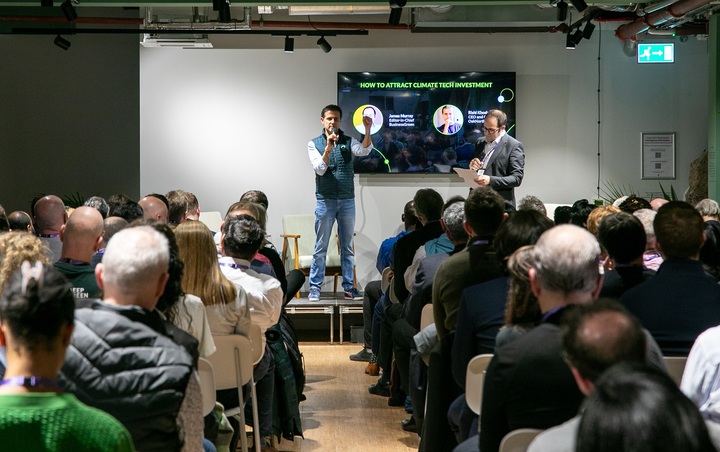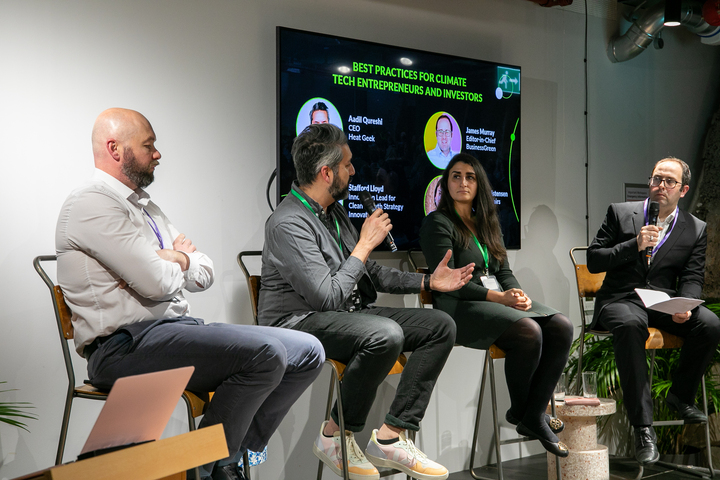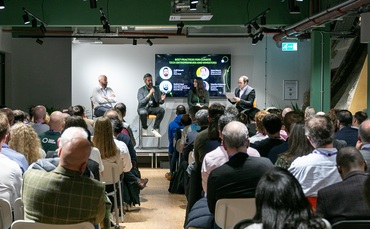On paper, the UK climate technology sector looks to be in rude health. Employing an estimated three million people and valued at over $1tr, it is the largest climate tech ecosystem in Europe, boasting over 5,000 climate tech start-ups and scale ups, according to McKinsey. The sector is also attracting investment, securing £2.6bn in total funding in 2023 and leaving the UK second only to the US as the premier location for climate tech entrepreneurs.
Yet these impressive headline numbers mask some deep-rooted challenges that any clean tech entrepreneur will be all-too-familiar with. While there is said to be a wall of money interested in backing climate technology firms, securing a share of that funding is no easy feat, particularly for those innovators seeking to make the jump from start-up to scale-up.
But if there is one person who knows a thing or two about funding growing UK firms, including multiple climate tech outfits, it is Rishi Khosla, co-founder and CEO of OakNorth Bank.
The bank was founded in 2015 with the specific aim of helping to scale entrepreneur-led businesses by providing fast and flexible finance to help fill a glaring gap in the UK finance market. Over the past decade, the company has practiced what it preaches, growing rapidly to reach a point where it has to date lent around $16bn to entrepreneurs up and down the country, helping to underpin the creation of 47,000 new jobs.
Last week, BusinessGreen’s editor in chief James Murray spoke to Khosla as part of an event hosted at the Sustainable Ventures climate tech hub in central London last week, in a bid to gain some insights into how climate tech firms can better attract the investment they need.
Speaking to an audience of green entrepreneurs and investors, Khosla said he was initially inspired to start OakNorth precisely because he had experienced the same sorts of challenges and pitfalls that so many climate tech innovators continue to face to this day in the UK. Namely, the challenges of growing while maintaining a healthy cash flow, retaining clients and building commercial success, and securing loans to support that journey.
“The idea for starting OakNorth really came from experience we had while building our first business,” he said. “We started our business with very little capital, and we were growing at a very fast speed, which means we didn’t have a lot of working capital left in the bank. So we thought it would be good to get a wider credit from a virtual bank in case for some reason we didn’t get paid on time from our customers.
“And after spending a few very undelightful months being kicked around by commercial banks and finally being kicked out, we stumbled across an institutional lender at one of the large investment banks who gave us 100 times the amount of capital that a commercial bank wasn’t willing to give us. That’s when we realised that there’s a massive inefficiency in the way that commercial banks support growth companies… We just thought to ourselves ‘wow, that’s a massive opportunity’. So when it came to selling the business, that’s what we decided to actually go and do something about it, and launch OakNorth.”
When OakNorth was born in 2015, it was only the third new bank to launch in the UK in over 150 years, but Khosla was not put off by the notoriously high barriers to entry in the banking sector. He was convinced the best model for supporting scale-up businesses in the UK was through a bank and the lending capabilities they should be providing. Fast forward to today, and the digital-only bank has supported scores of businesses, most of which have graduated from the start-stage state and are operating on around £1m or more in earnings, with an objective to push revenues up to £30m to £50m a year.
“It’s that scaling journey which we really support customers on,” Khosla explained. “Our view is that they’re businesses which are already somewhat proven – even if they are still relatively small, so there is clearly some risk. I would say that while many of them would be able to get some sort of loan at some sort of size from traditional banks, this would not necessarily help them or their growth… they wouldn’t get what they need to carry them through their scaling journey, which is where we really focus.”
Khosla believes many larger, traditional banks tend to be reluctant to provide support for scale-up businesses in the UK as the income margins are regarded as not being strong enough, so they instead opt to focus on larger, more established companies where risks are perceived to be lower.
This has resulted in what Khosla describes as a “computer says ‘no’ model”, which erects a financial roadblock in the path of many viable businesses. “The model says ‘no’ quite often, and therefore fails those businesses,” he said.
In contrast, OakNorth has built its own model designed to better understand where the risk and opportunities across the economy exist, Khosla explained. “What OakNorth has done is created a whole system which actually is driven to find the path to ‘yes’,” he said. The model is clearly working, as evidenced by that $16bn of lending and the fact OakNorth’s default rate remains vanishingly low given its focus on small and mid-sized businesses.

Not all of the businesses OakNorth supports are in the climate tech space, but by virtue of the green economy being a major source of both growth and innovation in the UK, many of them inevitably are.
“The whole trend towards decarbonisation, the amount of money which needs to be spent on that, and therefore the opportunities for businesses to play into that is just massive,” said Khosla. “It almost doesn’t matter what your political bent is, the fact is that decarbonisation is a trend which is going to continue. The only question is: how accelerated is that trend going to be? But ultimately, if you’re building a business where the tide is rising, it is much better than one where the tide is going away.”
Khosla acknowledged that policy and regulation can be “massively” helpful in supporting the build out of the UK’s climate tech industry. But he also warned that ultimately the most successful businesses need to demonstrate their value and viability regardless of the policy environment.
“If your whole businesses is predicated on the government doing something, I would encourage you to think again,” he said. “If that’s your singular bet, I just think that’s incredible dangerous. It is about finding the economic model which actually makes using climate tech the right choice economically, and has the benefit of clearly supporting decarbonisation. Getting there is where, actually, the politics almost don’t matter. Because fundamentally, if you can deliver a solution which is more economical and has climate benefits, you’re gong to win.”
For climate tech companies looking to pitch for funding, Khosla had several further tips, including a call for entrepreneurs to ensure they explain what their company does in clear and simple terms, and set out precisely how it plans to make money.
“So many times I’ll hear a pitch, and then I end up saying ‘ok, so now tell me what you actually do?'” he said. “It’s like you’ve heard all these words and enthusiasm, but you have no idea what the purpose of the company or idea is… What’s the problem you’re solving, and the opportunity?
Further along the scale-up journey, Khosla said he had seen many firms attempt to diversify their offering too quickly. “You have to have a single-minded conviction behind the business, and make sure that conviction is well placed,” he said. “You need to be incredibly hungry and focused, even when you start to see success… decisions on what you decide not to do are sometimes more important than what you decide to do, because that fundamentally helps to avoid getting off-track.”
Also speaking at the event was OakNorth’s corporate affairs director, Valentina Kristensen, who added that the bank’s decisions over whether to lend to a firm were often influenced by the track history, knowledge, and togetherness of the firm’s management team. “Something we do at OakNorth, which is very different to other lenders, is that we actually invite borrowers into the credit committee, so the entrepreneurs have the opportunity to actually sit and discuss their business with the decision makers,” she explained, adding that this approach also allows for feedback and improvements to be made to a pitch.
“That opportunity is great for the entrepreneur, but it also means that we get to see the white in their eyes and that helps us to decide: is this a business we can see a long-term relationship with?”

Kristensen was joined during a panel discussion at the event by Aadil Qureshi, CEO and co-founder at Heat Geek, and Stafford Lloyd, innovation lead for clean growth strategy at the government-backed Innovate UK agency.
Currently based at Sustainable Ventures’ London workspace, Heat Geek describes itself as a “one stop shop” platform where households, businesses, and heating industry professionals can get advice and support on everything from how to bleed a radiator through to selecting the best heat pump solution for a property. The aim is to help ease the many barriers to retrofitting homes and buildings by providing end-to-end support that can enable the roll out of a range of clean technologies.
Qureshi said Heat Geek’s experience of securing funding had been “pretty good, to be honest”, adding that a 20-year prior career in corporate roles had helped him ensure the company had in place all the basics of a good pitch. “I knew how to put a spreadsheet together,” he said. “I knew if the number at the bottom is red, it’s not good, and if it’s green, that’s good.”
But he added that the key was highlighting to investors how the strong fundamentals for the business were in line with growth trends across the green economy. “If you have a fundamentally positive unit economic business, and you marry that with a megatrend such as energy decarbonisation or sovereignty, and you can articulate that well to investors [then securing funding] is still hard, but no harder than it should be,” he said.
The nature of Heat Geek’s business also meant Qureshi was able to be more selective about the investment partners it chose to work with. “I think we were very fortunate to be in a position where we were able to choose,” he explained. “And what you realise is that the investors that bring capital plus capability are the ones in the early stages that can help a business to fly or not.”
Kristensen also stressed the importance of scale-up companies finding the right mix of financial partners, highlighting how the best funders can often bring invaluable advice and introductions to a network of prospective partners, suppliers, and clients that can serve to unlock faster growth. And she urged entrepreneurs to carefully consider the pros and cons of equity and debt financing, noting that debt is typically cheaper than equity deals.
Timing is also key for climate entrepreneurs, according to Qureshi, who highlighted the need to harness market trends – or perceptions of market trends – to your firm’s advantage. “In my old job, I would go to the VP and say I needed $5m for this thing, and they’d say ‘yes’ or ‘no’,” he said. “Now, if I need $5m, my existing investors now coach me: ‘pretend you don’t need it for as long as possible, but when you do need it, tell everyone you need it’.
“There’s a lot of cloak and dagger tactics that goes on – a bit of a charade, shall we say – to create that FOMO [fear of missing out], and timing is everything… Fundamentally, early-stage investing is very much about perception and the herd mentality.”
Lloyd similarly urged entrepreneurs to make sure they have done their research when preparing to pitch in what can be a highly competitive market for climate tech funding. “Educating entrepreneurs about how later stage finance works and how you need to develop and present your business to access that is one thing I think wouldn’t cost too much money to do, but could be quite catalytic in terms of helping entrepreneurs to better understand what it takes to get a deal over the line,” he said.
Climate tech entrepreneurs in the UK continue to face significant challenges – whether it is from the ‘chop and change’ nature of the policy environment over the past decade, the growing buzz around AI that has turned many investors’ heads, or wider economic and geopolitical headwinds – but Lloyd sought to offer up an important dose of optimism.
“The money is there,” he said. “There’s something like $2tr of unallocated capital worldwide just looking to be part of something that will give it a return. That’s equity, but you could pretty much add double that with debt. So, you put all that together, and there’s something like $7tr of money just waiting to be spent.
“It’s about how to get a business to a point where it can access money. That’s what I think we really need to focus on: can we de-risk things much faster? It might not be through money, it could be through other means – but offering that support to get start-ups to the point where they can say ‘is this viable at commercial scale, or not?’ That can make things happen quicker.”
The UK already boasts one of the world’s leading climate tech sectors – on paper at least. The trick now is for the sector to catalyse the investment needed to ensure the many promising companies in the climate tech community can scale up fast enough to deliver on the UK’s climate goals. Thankfully a growing ecosystem of investors, advisors, and entrepreneurs – OakNorth very much included – is committed to delivering precisely that.
‘An Evening with BusinessGreen and Sustainable Ventures: How to attract climate tech investment’ was supported by OakNorth.





